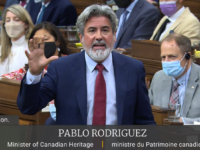Later today, the Standing Committee on Canadian Heritage will vote on a government-backed motion that would compel Google and Facebook to disclose private third-party communications dating back years that could sweep in the private communications of thousands of Canadians. The motion, which is obvious retribution for opposing Bill C-18, is a stunning attack on the privacy of Canadians and could have a chilling effect on public participation. However, you don’t have to take my word for it. The Canadian Chamber of Commerce has issued a dire warning about the motion in a public letter, suggesting it is undemocratic and urging MPs to reject it.
Blog
Government-Backed Motion Demands Disclosure of Years of Third-Party Communications With Google and Facebook in Retribution for Opposing Bill C-18
The government plans to introduce a motion next week requiring Google and Facebook to turn over years of private third-party communication involving any Canadian regulation. The move represents more than just a remarkable escalation of its battle against the two tech companies for opposing Bill C-18 and considering blocking news sharing or linking in light of demands for hundreds of millions in payments. The motion – to be introduced by the Parliamentary Secretary to the Minister of Canadian Heritage (yes, that guy) – calls for a series of hearings on what it describes as “current and ongoing use of intimidation and subversion tactics to avoid regulation in Canada”. In the context of Bill C-18, those tactics amount to little more than making the business choice that Heritage Minister Pablo Rodriguez made clear was a function of his bill: if you link to content, you fall within the scope of the law and must pay. If you don’t link, you are out of scope.
Heritage Minister Pablo Rodriguez Contradicts His Own Bill and Department Officials in Effort to Defend Bill C-18
Canadian Heritage Minister Pablo Rodriguez is on the defensive as he tries to defend Bill C-18 in the wake of both Google and Facebook signalling that they may remove Canadian news from search results and social media sharing in light of the government’s approach that creates mandated payments for links. Rodriguez appeared on CBC yesterday and had no answers for the questions about what he will do if the companies walk away from news given government estimates that they could be on the hook for 35% of the news expenditures of every news outlet in Canada if they continue to link to their news content. More notably, he contradicted both his own bill and his own department officials when he told Postmedia that “C-18 has nothing to do with how Facebook makes news available to Canadians.” For those who followed months of gaslighting with Bill C-11, this comment will provide a sense of deja-vu since Rodriguez sometimes leaves the impression has only read media lines, rather than his own legislation.
Cutting Through the Noise of the Bill C-11 Debate: Regulating User Content Remains a Reality
The debate on Senate amendments to Bill C-11 continued in the House of Commons yesterday, with hours devoted to MPs from all parties claiming misinformation by their counterparts. There were no shortage of head-shaking moments: MPs that still don’t know that CraveTV is not a foreign streaming service, references to Beachcombers as illustrations of Cancon, comparisons to China that go beyond the reality of the bill, calls for mandated cultural contributions from TikTok even as the government bans the app, and far too much self-congratulation from MPs claiming to have done great work on the bill when the Senate review demonstrated its inadequacy. But buried amongst those comments were several notable moments that illustrated the reality and risks of Bill C-11.











